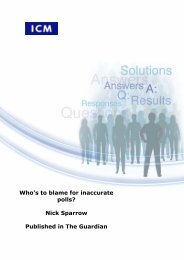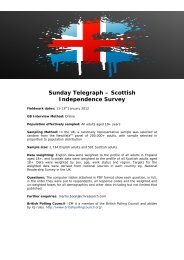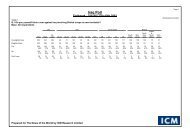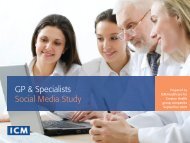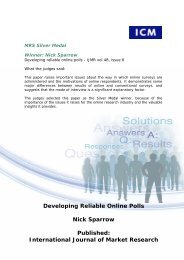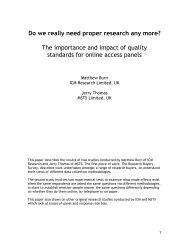Patient-Doctor Global Communication Assessment - ICM Research
Patient-Doctor Global Communication Assessment - ICM Research
Patient-Doctor Global Communication Assessment - ICM Research
You also want an ePaper? Increase the reach of your titles
YUMPU automatically turns print PDFs into web optimized ePapers that Google loves.
<strong>Patient</strong>-<strong>Doctor</strong><br />
<strong>Global</strong> <strong>Assessment</strong> – UK Report<br />
Insights from the Worldwide Independent Network (WIN) of Market <strong>Research</strong><br />
January 2011
Key UK insights<br />
Summary of insights from a UK perspective<br />
The UK relies heavily<br />
on HCPs for advice –<br />
89% do - but are also<br />
web-savvy with 37%<br />
looking for information<br />
on online product /<br />
disease sites<br />
A third of UK patients<br />
go to a doctor they<br />
haven’t seen before<br />
Multi-source<br />
information<br />
UK patients tend not<br />
to be aware of<br />
alternatives to what<br />
they’re prescribed –<br />
34% compared to 41%<br />
globally<br />
Self-reliance<br />
Want choice<br />
usually happy with<br />
prescription<br />
Around a half of UK<br />
patients would<br />
recommend their<br />
doctor and rate them<br />
relatively highly for<br />
communication<br />
UK patients are less<br />
likely to rely on a<br />
doctor to keep them<br />
healthy and are more<br />
likely to visit the doctor<br />
for acute conditions
Source of Information<br />
Q. In the past year, which of the following have you used to gain information about your health?<br />
• <strong>Global</strong>ly, patients gain most of the information about their health<br />
from health professionals (71%).<br />
• Furthermore, although friends and family (47%) are the next<br />
preferred source to gain health information they are far behind<br />
health professionals.<br />
UK patients rely heavily on<br />
healthcare professionals (HCPs)<br />
for information – but they are<br />
also web-savvy
<strong>Patient</strong> Trust<br />
Q. I rely on a doctor to keep me healthy.<br />
Spain<br />
88%<br />
• The majority (67%) of individuals<br />
throughout the world rely on a<br />
doctor to keep them healthy.<br />
• Scores were lowest in Austria,<br />
China, Switzerland, the UK, and<br />
Iceland.<br />
India<br />
France<br />
Japan<br />
Netherlands<br />
Italy<br />
Turkey<br />
Russia<br />
78%<br />
78%<br />
77%<br />
77%<br />
83%<br />
82%<br />
81%<br />
Lebanon<br />
77%<br />
Korea<br />
73%<br />
UAE<br />
73%<br />
Bulgaria<br />
71%<br />
Brazil<br />
70%<br />
USA<br />
69%<br />
UK respondents may rely on HCPs for<br />
information, but the majority don’t<br />
think their doctor is responsible for<br />
keeping them healthy.<br />
Only Iceland believes responsibility lies<br />
less with a doctor.<br />
Saudi Arabia<br />
Canada<br />
Australia<br />
Pakistan<br />
Austria<br />
China<br />
Switzerland<br />
UK<br />
49%<br />
49%<br />
48%<br />
46%<br />
57%<br />
56%<br />
63%<br />
68%<br />
Strongly/Slighty<br />
Agree<br />
Iceland<br />
41%<br />
TOTAL<br />
67%
Purpose of Visit<br />
Q. What was the main purpose to your most recent visit with the doctor?<br />
<strong>Patient</strong>s in the UK are less likely to<br />
visit the doctor with no specific<br />
condition (11%) e.g. for health<br />
check ups<br />
<strong>Patient</strong>s in the UK and Japan are<br />
those who most frequently visit the<br />
doctor to follow up on a previously<br />
diagnosed condition (48%).<br />
• Most patients see physicians for a specific<br />
problem - either for a follow-up on a previously<br />
diagnosed condition (37%) or make a first<br />
appointment for a new problem (33%).<br />
• Chinese are the least likely to follow-up with a<br />
doctor on a previously diagnosed condition<br />
(14%).<br />
Regular<br />
appointment for<br />
no specific<br />
condition<br />
Follow-up for<br />
previously<br />
diagnosed<br />
condition<br />
First<br />
appointment for<br />
a new problem<br />
Other/<br />
DNK/DNA<br />
China 39% 14% 42% 4%<br />
Italy 38% 35% 17% 10%<br />
USA 36% 41% 16% 7%<br />
Switzerland 35% 22% 33% 9%<br />
Brazil 32% 39% 25% 3%<br />
Russia 31% 28% 29% 12%<br />
Spain 29% 45% 21% 6%<br />
Canada 27% 41% 20% 12%<br />
Austria 26% 31% 29% 14%<br />
Pakistan 26% 45% 17% 13%<br />
Saudi Arabia 20% 34% 45% 1%<br />
France 20% 34% 28% 18%<br />
Bulgaria 19% 44% 28% 9%<br />
Lebanon 18% 43% 37% 1%<br />
Korea 17% 25% 44% 14%<br />
UAE 16% 27% 49% 8%<br />
Iceland 15% 31% 33% 20%<br />
Australia 14% 43% 32% 11%<br />
Japan 14% 48% 27% 11%<br />
Turkey 11% 34% 55% 1%<br />
UK 11% 48% 31% 10%<br />
Netherlands 7% 40% 41% 12%<br />
India 3% 35% 62% 0%<br />
TOTAL 21% 37% 33% 9%
Main Conditions<br />
Q. Please specify your main problem or condition<br />
<strong>Global</strong>ly, the main problem or<br />
condition an individual will go<br />
to see the doctor for is the<br />
flu/feeling ill/fever (12%).<br />
In the UK patients tend to<br />
visit the doctor for more<br />
complicated conditions such<br />
as Joint and muscle pain or<br />
depression and anxiety and<br />
less for flu and fevers when<br />
compared to the global<br />
average<br />
Condition <strong>Global</strong> UK<br />
Flu / feeling ill / fever 12% 3%<br />
Hypertension / high blood pressure / heart disease 10% 9%<br />
Joint or muscle pain / arthritis 9% 11%<br />
Stomach pain / digestive problem 5% 3%<br />
Rash / skin problem 4% 6%<br />
Diabetes 4% 5%<br />
Physical injury (scrape, cut, bruise, broken bone, etc.) 4% 2%<br />
Allergies 3% 2%<br />
Depression / anxiety 3% 6%<br />
Headache 2% 1%<br />
High cholesterol 2% 3%<br />
Pregnancy 2% 1%<br />
Breathing difficulty / asthma 3% 2%<br />
Genital infection / problem 1% 1%<br />
Fatigue / feeling tired 1% 1%<br />
Cancer 1% 2%<br />
Frequent or burning urination 1% 1%<br />
Inability to sleep well 1% 1%<br />
Constipation 0% 0%<br />
Other 21% 23%<br />
I don't know / I prefer do not to answer / No response 12% 6%
<strong>Patient</strong> Visit<br />
Q. Have you seen this doctor before?<br />
A third of UK patients saw a doctor<br />
they hadn’t seen before.<br />
Spain<br />
France<br />
Bulgaria<br />
Canada<br />
80%<br />
79%<br />
78%<br />
76%<br />
Austria<br />
76%<br />
Italy<br />
75%<br />
Switzerland<br />
75%<br />
Australia<br />
72%<br />
USA<br />
72%<br />
• On average, 58% of respondents return<br />
to see a doctor they have seen more<br />
than once.<br />
Lebanon<br />
Netherlands<br />
UK<br />
Japan<br />
71%<br />
70%<br />
66%<br />
64%<br />
• Citizens of Spain, France and Bulgaria<br />
are most likely to have seen their<br />
doctor before.<br />
Iceland<br />
Russia<br />
UAE<br />
India<br />
58%<br />
54%<br />
51%<br />
51%<br />
• On the other hand, Chinese least<br />
frequently see a doctor they have seen<br />
before with only 16% who responded<br />
that their last visit was with a doctor<br />
they had previously seen.<br />
Korea<br />
Pakistan<br />
Brazil<br />
Saudi Arabia<br />
Turkey<br />
China<br />
TOTAL<br />
16%<br />
34%<br />
39%<br />
38%<br />
46%<br />
46%<br />
Yes, more than<br />
once<br />
58%
<strong>Patient</strong> Choice<br />
Q. I prefer that my doctor just tell me what to do rather than give me choices.<br />
UK patients don’t like to be told what to do<br />
and they want choices of information.<br />
• <strong>Global</strong>ly, 60% of respondents prefer that a doctor<br />
just tell them what to do rather than give them<br />
choices.<br />
• Most citizens preferred being told what to do in<br />
Italy (87%), Turkey (84%) and Spain (83%).<br />
• Austria, Canada, the USA, Australia and the UK are<br />
the countries where most respondents would not<br />
prefer being told what to do by their doctor with<br />
72%, 64%, 62%, 58%, and 56% of them respectively<br />
who would disagree with this statement.<br />
Wants<br />
Choices<br />
Told what to<br />
do DNK/DNA<br />
Austria 72% 28% 1%<br />
Canada 64% 34% 2%<br />
USA 62% 37% 1%<br />
Australia 58% 41% 1%<br />
UK 56% 39% 5%<br />
Iceland 47% 45% 8%<br />
China 46% 55% 0%<br />
Japan 40% 54% 6%<br />
Russia 40% 59% 1%<br />
Pakistan 36% 61% 3%<br />
Netherlands 36% 62% 3%<br />
Switzerland 34% 62% 4%<br />
Brazil 31% 67% 2%<br />
France 30% 68% 2%<br />
India 28% 67% 5%<br />
Korea 24% 76% 1%<br />
Saudi Arabia 21% 78% 1%<br />
UAE 20% 79% 1%<br />
Lebanon 18% 82% 0%<br />
Bulgaria 18% 75% 7%<br />
Turkey 14% 84% 2%<br />
Spain 14% 83% 4%<br />
Italy 13% 87% 0%<br />
TOTAL 38% 60% 3%
Prescription Medication and Alternatives<br />
Q. Are you aware of any alternative to your prescription medication that was available or are you only<br />
aware of the medication you were prescribed?<br />
Q. Did you and your doctor discuss any alternative medications to the one you were prescribed?<br />
Q. Why do you think you were not prescribed the alternative?<br />
When it comes to prescriptions though,<br />
only a third of UK patients are aware of<br />
any alternatives.<br />
• Overall, 41% of respondents throughout the<br />
world were aware of an alternative to their<br />
prescribed medication. Of those, an average<br />
of 64% discussed these alternatives with their<br />
doctor.<br />
• Furthermore, a high of 70% who were aware of<br />
an alternative believe they were prescribed<br />
the best medication for their condition by<br />
their doctor.<br />
• Icelanders (61%), Russians (60%), Austrians<br />
(58%) and Americans (57%) are the most aware<br />
of alternatives while Koreans (20%) and<br />
Spaniards (18%) are the least aware.<br />
Yes -<br />
discussed any<br />
alternative<br />
Prescribed<br />
the best<br />
medication<br />
Aware of<br />
alternative<br />
Iceland 61% 59% 32%<br />
Russia 60% 78% 69%<br />
Austria 58% 75% 75%<br />
USA 57% 72% 68%<br />
Australia 54% 72% 81%<br />
Canada 51% 69% 75%<br />
China 48% 87% 86%<br />
Japan 48% 61% 70%<br />
India 46% 35% 57%<br />
France 44% 66% 73%<br />
Netherlands 40% 60% 77%<br />
Of those<br />
UK 34% 66% 79%<br />
aware of an<br />
Pakistan 31% 43% 81%<br />
alternative<br />
Turkey 29% 6% 32%<br />
Switzerland 28% 65% 66%<br />
Brazil 27% 51% 67%<br />
Lebanon 27% 45% 78%<br />
Italy 25% 44% 36%<br />
UAE 25% 60% 68%<br />
Saudi Arabia 24% 50% 68%<br />
Bulgaria 23% 86% 76%<br />
Korea 20% 61% 65%<br />
Spain 18% 45% 44%<br />
TOTAL 41% 64% 70%
Recommending your doctor<br />
Q. Please rate the doctor you most recently met with on a scale of 0-10, where 0 means you would<br />
never recommend and 10 means you would definitely recommend this doctor<br />
• Respondents who give a 9 or higher out of 10<br />
to this question are referred to as promoters<br />
and are considered as individuals who would<br />
recommend their doctor.<br />
Australia<br />
Austria<br />
Switzerland<br />
Canada<br />
USA<br />
66%<br />
62%<br />
62%<br />
61%<br />
60%<br />
18%<br />
20%<br />
31%<br />
26%<br />
26%<br />
8%<br />
17%<br />
8%<br />
12%<br />
13%<br />
• Overall, less than half (44%) of respondents<br />
are likely to recommend their doctor.<br />
Turkey<br />
Lebanon<br />
Iceland<br />
59%<br />
56%<br />
55%<br />
23%<br />
35%<br />
27%<br />
19%<br />
9%<br />
16%<br />
• Overall, Australians are the most likely to<br />
recommend their doctors with 66% of<br />
promoters. Meanwhile, Chinese are the least<br />
likely to recommend their doctors with a low<br />
promoter score of 6%.<br />
Brazil<br />
UK<br />
Saudi Arabia<br />
France<br />
UAE<br />
Spain<br />
Bulgaria<br />
53%<br />
49%<br />
49%<br />
49%<br />
48%<br />
47%<br />
42%<br />
31%<br />
30%<br />
28%<br />
34%<br />
33%<br />
38%<br />
32%<br />
16%<br />
19%<br />
21%<br />
17%<br />
18%<br />
12%<br />
25%<br />
India<br />
36%<br />
48%<br />
14%<br />
Italy<br />
35%<br />
44%<br />
21%<br />
About half of all UK respondents would<br />
recommend their doctor – above the<br />
global average<br />
Russia<br />
Pakistan<br />
Netherlands<br />
Japan<br />
Korea<br />
33%<br />
30%<br />
29%<br />
18%<br />
16%<br />
35%<br />
42%<br />
31%<br />
39%<br />
57%<br />
50%<br />
36%<br />
35%<br />
29%<br />
11%<br />
China<br />
6%<br />
17%<br />
77%<br />
Total<br />
44%<br />
32%<br />
22%<br />
Promoters: rating 9-10<br />
Fence Sitters: Rating 7-8<br />
Detractors: Rating of 6-0
<strong>Global</strong> Net Promoter (NPS) Score Summary Summer 2010<br />
NPS (Net Promoter Score) around the world<br />
High NPS scores<br />
More citizens in Australia, Austria, Brazil, Canada,<br />
Lebanon, Spain, Switzerland, Turkey and the USA are<br />
likely to recommend their doctor with NPS scores<br />
above average.<br />
Average NPS scores<br />
Bulgaria, France, India, Italy, the<br />
Netherlands, Saudi Arabia, the UAE<br />
and the UK have average NPS<br />
Scores.<br />
*The data for this graph is based on questions presented on slide 10.<br />
Low NPS scores<br />
Respondents in China, Japan, Korea,<br />
Pakistan and Russia have very low NPS<br />
Scores.<br />
The Net Promoter Score is obtained by asking customers a single question on a 0 to 10 rating scale: "How likely is it that you would recommend our company<br />
to a friend or colleague?" Based on their responses, customers are categorized into one of three groups: Promoters (9-10 rating), Passives (7-8 rating), and<br />
Detractors (0-6 rating). The percentage of Detractors is then subtracted from the percentage of Promoters to obtain a Net Promoter score.*
CAT (<strong>Communication</strong> <strong>Assessment</strong> Tool)<br />
Q. Thinking of your most recent visit, please rate the doctor’s communication with you.<br />
• The <strong>Communication</strong> <strong>Assessment</strong> Tool (CAT) measures the<br />
interpersonal and communication skills. This score is obtained by<br />
asking 15 questions and employs a five-point response scale, with<br />
5=excellent. Fourteen items focus on the physician and one targets<br />
the staff.*<br />
• The CAT score is the average of the excellent ratings for the 15<br />
physician communication skill attributes (see previous slide).<br />
• <strong>Global</strong>ly, the average CAT score of the 23 surveyed countries is at<br />
29%.<br />
• Countries with the highest CAT scores include the USA, Saudi Arabia,<br />
Australia and Canada with scores of 52%, 51%, 49%, and 47%<br />
respectively.<br />
• India (17%), Korea (15%), Turkey (12%), Japan (11%), Italy (11%),<br />
Pakistan (7%), and China (4%) have the lowest scores.<br />
UK respondents score their doctors<br />
relatively highly on communication<br />
CAT<br />
Country (<strong>Communication</strong><br />
<strong>Assessment</strong> Tool)<br />
USA 52%<br />
Saudi Arabia 51%<br />
Australia 49%<br />
Canada 47%<br />
UK 42%<br />
Austria 40%<br />
Lebanon 40%<br />
France 39%<br />
UAE 37%<br />
Switzerland 35%<br />
Brazil 30%<br />
Iceland 30%<br />
Bulgaria 25%<br />
Netherlands 23%<br />
Russia 22%<br />
Spain 21%<br />
India 17%<br />
Korea 15%<br />
Turkey 12%<br />
Japan 11%<br />
Italy 11%<br />
Pakistan 7%<br />
China 4%<br />
Total 29%<br />
12<br />
*Source: http://www.pec-journal.com/article/S0738-3991(07)00178-4/abstract
<strong>Global</strong> <strong>Communication</strong> <strong>Assessment</strong> Tool (CAT) Summary<br />
Summer 2010<br />
<strong>Patient</strong>-<strong>Doctor</strong> Relationship around the world<br />
High CAT scores<br />
Citizens in Australia, Austria, Canada, Lebanon, Saudi<br />
Arabia, the UK and the USA are very satisfied with<br />
their communication with their doctors with CAT<br />
scores above average<br />
Average CAT scores<br />
Respondents in Brazil, Bulgaria,<br />
France, Iceland, the Netherlands,<br />
Russia, Spain, Switzerland and the<br />
UAE have average CAT scores<br />
Low CAT scores<br />
Citizens in China, Japan, Korea, India, Italy,<br />
Pakistan and Turkey are the least satisfies<br />
with their doctor with below average CAT<br />
scores<br />
*The data for this graph is based on questions presented on slide 12.
14<br />
Appendix
Background & <strong>Research</strong><br />
Background<br />
WIN, the Worldwide Independent Network of Market <strong>Research</strong>,<br />
the largest independent organization of Market <strong>Research</strong> firms<br />
with members in 51 countries, prepared this landmark review of<br />
patient-physician communication.<br />
<strong>Research</strong><br />
<strong>Patient</strong>-doctor communication critically influences the effectiveness of<br />
medical education initiatives, treatment decisions and patient<br />
compliance to recommended treatments.<br />
WIN conducted this ground-breaking study on patient-doctor<br />
communication throughout the world to provide the healthcare<br />
stakeholders with a better understanding on how patients perceive<br />
communication skills of their doctor, how patients engage their<br />
physician, how treatment choices are influenced, the frequency and<br />
preferred modes of interaction and sources of influential information.
Context and Methodology<br />
• This global study includes 22,581<br />
respondents over the age of 18 years old<br />
who visited a doctor within the last 12<br />
months.<br />
• The survey was conducted from the end of<br />
May to the beginning of August 2010 in 23<br />
countries throughout the world.<br />
• The table to the right presents a summary of<br />
the methodology used in each country to<br />
conduct this survey.<br />
• Each sample is representative of its<br />
country’s population in terms of sociodemographic<br />
variables. Sample sizes ensure<br />
accurate generalizations to the total<br />
population and allow a very precise<br />
interpretation of the results.<br />
• The margin of error per country is between<br />
+/- 2.42% and 4.98%.<br />
Country Firm Method Sample<br />
Margin of<br />
Error<br />
Australia Colmar Brunton Online 1028 3.06%<br />
Austria Gallup Austria CATI 959 3.16%<br />
Brazil Ibope Inteligencia Face to Face 1373 2.64%<br />
Bulgaria BBSS Face to Face 1000 3,10%<br />
Canada Leger Marketing Online 1036 3.04%<br />
China CRC <strong>Research</strong> Online 1000 3.10%<br />
France BVA CAWI 1000 3.10%<br />
Iceland Capacent Online 717 3.66%<br />
India MaRS Face to Face 1001 3.10%<br />
Italy Doxa Face to Face 762 3.55%<br />
Japan NRC <strong>Research</strong> Online 1000 3,10%<br />
Korea Gallup Korea Online 1000 3.10%<br />
Lebanon PARC CATI 400 4.90%<br />
Netherlands Marketresponse Online 947 3.18%<br />
Pakistan Gallup Pakistan Face to Face 1514 2,52%<br />
Russia Romir Online 910 3.25%<br />
Saudi Arabia PARC CATI 1047 3.03%<br />
Spain Instituto DYM Face to Face 496 4.40%<br />
Switzerland Isopublic Face to Face 388 4.98%<br />
Turkey Barem <strong>Research</strong> CATI 1017 3.07%<br />
UAE PARC CATI 1097 2.96%<br />
UK <strong>ICM</strong> <strong>Research</strong> Online 1640 2.42%<br />
USA TRiG Online 1249 2.77%



